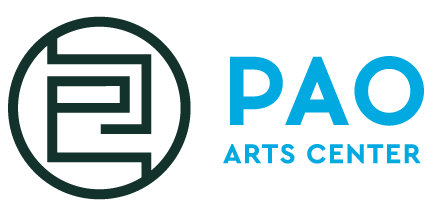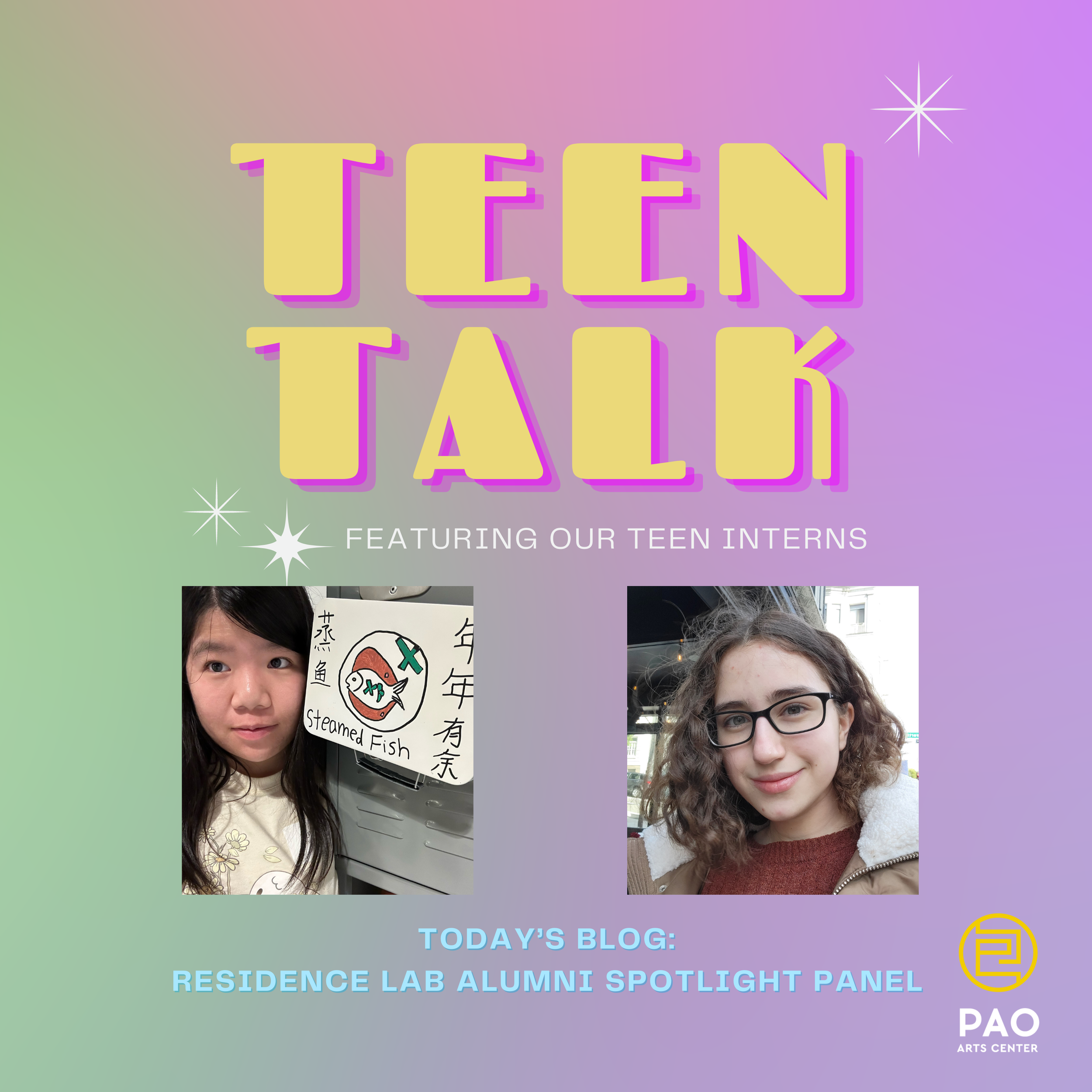Pao Arts Center Teen Interns Reflect on ResLab Alumni Spotlight Panel
Residence Lab (ResLab) was an innovative residency by Pao Arts Center and Asian Community Development Corporation (ACDC) that empowers artists and residents to collectively preserve Boston’s Chinatown through creative and artistic activation of underutilized sites in the neighborhood.
居民与艺术 (Residence Lab, 又名ResLab) 是包氏文艺中心和亚美社区发展协会 (ACDC) 的创新社区艺术项目。该项目通过富有创造力的活动来激活唐人街附近未充分利用的场地,使艺术家与居民齐心协力利用艺术维护波士顿唐人街。
At the Residence Lab Alumni Spotlight Panel, one of the first things we noticed was how the event was translated. From the introduction, to the land acknowledgement, to the panelist statements, speakers paused as statements were translated from English into Mandarin or Mandarin into English. These translation services are important because they encourage collaboration between residents and artists, allowing for equal space as the foundation of their work, which we think embodies the spirit of ResLab.
在这次活动中,我注意到的第一件事情就是所有的内容都是翻译的. 从介绍到土地的认知,再到小组成员的发言,发言人在发言时都会停顿一下,因为发言被从英语翻译成普通话,或者从普通话翻译成英语。有人说,这些翻译服务很重要,因为它鼓励居民和艺术家之间的合作:允许有一个平等的空间作为基础,我认为这体现了 ResLab 的宗旨。
Before concluding the alumni talks, each alumnus was asked for one word to describe their ResLab experience. Here’s what they said!
在结束校友座谈之前,他们被问及用什么词来形容自己的 ResLab 体验。他们是这样说的:
Maggie Chen: Unbelievable
“I’m not born an artist [and] couldn’t believe I could do artwork, but I did it!”
难以置信;"我不是天生的艺术家,而且不敢相信自己能做艺术品,但我做到了!"
Maggie Chen (she/her) described how she first started engaging with the Chinatown community as a way to get her kids to spend less time in front of screens, a comment that sparked a chuckle through the crowd. As she continued, she claimed she was not born an artist, so she was worried she wouldn’t be able to do a good job in ResLab. Despite her doubts, she participated in ResLab and her experience with ResLab inspired her to become a voice for the Chinatown community to advocate for community resources and voter registration. Now, even her son is an active member of Chinatown, participating in community service and activism through ACDC (Asian Community Development Corporation). Despite only needing 50 community service hours to graduate, she was proud to share that he has over one hundred!
在介绍了 ResLab 背后的组织机构之后,Maggie Chen(她) 首先回答了第一位小组成员的问题: "您是如何加入 ResLab 的,这段经历对您参与华埠活动产生了怎样的影响?她谈到,第一次参与中国城社区活动是为了让她的孩子们减少在屏幕前的时间,这句话引发了全场的笑声。接着,她谈到自己并不是天生的艺术家,她说自己不会画画,也没有色彩感,所以担心自己做不好。在参加 ResLab 的过程中,她了解了唐人街的历史,以及唐人街居民所面临的虐待和不公平待遇。她在 ResLab 的经历启发她要成为中国城社区的代言人,倡导更多的社区资源和登记投票。最后,她向我们讲述了她的儿子现在如何成为中国城社区的积极成员,如何通过Asian Community Development Corporation(ACDC)参与社区服务和活动。尽管他只需要 50 个社区服务小时就能毕业,但他已经有一百多个小时了!
Krina Patel: Community
Artists from her community and people of all cultures were able to work together.
社区;艺术家和各种文化背景的人能够一起工作。
Krina Patel (she/her), one of the ResLab artists, described her experience with Chinatown as someone who lives near the neighborhood and frequently shops in Chinatown for the Asian fruits and vegetables. During ResLab, she worked with Chinatown residents Angela and Diany, who, she added, she still keeps in touch with today. When planning for their art installation, they thought about how the first thing they ask when they see their families is, “Have you eaten yet?”, which was the inspiration for their project. She talked about how, in spite of having to “shelter in place” in India at the start of the COVID-19 pandemic and having a 10-hour time difference, they still met regularly for ResLab. She ended by sharing an important takeaway from her experience in ResLab: “we all . . . can work collaboratively if all stakeholders are invested in the project.”
Krina 被问及 ResLab 如何塑造了她与唐人街的关系,以及她从这段经历中获得了什么。Krina与唐人街关的系和别人截然不同,她住在唐人街附近,经常在唐人街购买她熟悉的亚洲水果和蔬菜。她曾与唐人街居民的Angela和Dany合作过,她还说,她至今仍通过 与她们保持联系。在讨论他们希望自己的艺术装置是什么时,他们想到了当他们见到家人时,家人问的第一句话是 "你吃了吗?"这就是他们这个项目的灵感来源。她谈到,尽管在 COVID-19 大流行之初,他们不得不在印度 "就地避难",而且有 10 个小时的时差,但他们仍然定期在 ResLab 上见面。
Amanda Beard Garcia: Hope
Amanda’s experience with ResLab created a sense of identity and community that they’ve needed these past couple years.
希望: 他们在 ResLab 的经历为他们创造了一种认同感和社区感,而这正是他们过去几年所需要的。
Next, Amanda Beard Garcia (she/they), who was asked about what aspects they found surprising during their time with ResLab. She talked about how quickly she felt at home in Chinatown. As a child, Amanda recalled how her mom spoke negatively of Chinatown, describing it as dirty, congested, and unsafe, but learning about the history of Chinatown during ResLab helped her understand that her mother’s stigma came from redlining and housing policies. They shared that ResLab workshops were very vulnerable. When they told Yanna and May, the residents they worked with, that they were taking Cantonese lessons and wearing their grandmother’s jade necklace, Yanna and May were touched and decided to take her under their wing. Ultimately, Amanda says ResLab allowed her to reforge her connection with Chinatown on her own.
当Amanda(她/他们)被问及在 ResLab 学习期间有哪些方面感到惊讶或有哪些发现时。她谈到,在唐人街很快就有了家的感觉,这让她感到非常惊讶。小时候,她妈妈对唐人街的评价很负面,认为唐人街肮脏、拥挤、不安全,但在 ResLab 学习唐人街的历史后,Amanda明白了她妈妈的成见来自于红线和住房政策。她们分享说,ResLab 工作坊非常脆弱,并提到她们告诉与她们一起工作的居民 Yanna 和 May,她们正在上粤语课并戴着祖母的玉石项链。他们说,他们根本不知道她是中国人,于是就把她带在身边。最终,ResLab 让她自己重新建立了与唐人街的联系。
Pihua Lin: Thankful
She has two children who were also part of the making of the installation, and ResLab was an opportunity for her to bond with them.
感谢: 她的两个孩子也参与了装置的制作,ResLab 是她与孩子们建立联系的机会。
Pihua Lin (she/her) also spoke about learning the history of Chinatown during her participation in ResLab 2019. She specifically mentioned learning about the contributions that generations of Chinese Americans have been putting in to fight for their rights. It inspired her to preserve traditional Chinese culture while collecting new energy. Pihua also described the inspiration behind “A House Shaped Dream,” the ResLab project she helped create, which was a public wood structure shaped like a house. It was decorated like a traditional Chinese house and with pictures hung up by kids from the Josiah Quincy Elementary School. A speaker played sounds from a Chinese tea house and sounds of a Chinatown street. The house represented the dreams of the communities, such as stable and comfortable housing and green space. Although the house doesn’t look fancy, it’s stable. Pihua’s ResLab team wanted it to inspire intergenerational communication, connection interaction between each other and residents.
被问到同样问题的 Pihua(她/她)也谈到,她只是在参加 ReLab 2019 期间了解了唐人街的历史。她特别提到了解到几代美国华人为争取自己的权利所做出的贡献。这启发了她要在传承中国传统文化的同时,集聚新的能量。接着,她谈到了自己参与的 ResLab 项目 "A House Shaped Dream "背后的灵感来源,这是一个形似房子的木结构建筑。她说,这个房子看起来并不华丽,但很稳固。房子装饰得像中国传统民居,还挂着乔赛亚-昆西小学的孩子们画的画。扬声器(?)播放着中国茶馆的声音和唐人街的声音。房子代表了社区的梦想,如稳定舒适的住房和绿色空间。他们希望通过这种方式激发居民之间的联系和互动,促进代际交流,让更多居民关注自己的生活质量。
Sheila Novak: Generate
They collectively reimagined the Chinatown space and brought the public and community into the project.
创造: 他们重新规划了唐人街的空间,并将公众和社区带入项目中。
Sheila Novak (she/her) talked about how ResLab was particularly exciting because of its emphasis on the idea of co-creation. Sheila said, in our society, art is thought of as an individual process, so they were excited to collaborate as a pair. During their first meeting, Shiela and her ResLab partner Cass discussed creativity. Sheila said that “Cass did not see herself as an artist, but, when we met, she shared her pandemic project which was a meticulous miniature greenhouse, complete with plants and furniture,” showing Cass’s natural creativity. Sheila viewed both Cass and herself as artists that were working together, even if Cass didn’t think the same way. While she did try to challenge Cass to become more of an artist, working with Cass also challenged her because Cass wasn’t interested in any of the types of projects Sheila was familiar with. Rather, Cass wanted a functional piece that was preferably something for young people. Only when they had a design they both liked did the creative process more forward, making for a truly co-creative process.
Sheila 的问题集中在 ResLab 期间共同学习、共同创造和庆祝过程的亮点上。她们谈到 ResLab 令人特别兴奋的地方是共同创作的理念,正如她们所说,在我们的社会中,艺术被认为是一个个人的过程,所以她们很高兴能作为一对搭档进行合作。在第一次见面时Cass和Sheila讨论了Cass的创造力。Sheila说,"Cass并不认为自己是一名艺术家,但当我们见面时,她分享了她的大流行病项目,那是一个精心制作的微型温室,里面有植物和家具",这显示了Cass的创造力和创造事物的能力。尽管 Sheila 并不这么认为,但她认为 Cass 和她自己都是一起工作的艺术家。在共同学习方面,Sheila认为,虽然她要求Cass更多的成为一个艺术家,但与Cass一起工作确实对她作为艺术家提出了挑战,因为Cass对Sheila所熟悉的任何类型的项目都不感兴趣,她想要的是一件实用的作品,最好是为年轻人设计的作品。Sheila衡量成功与否的标准是小卡对作品的感受,她总是质疑:这是她的作品吗?这是她的作品,我的作品,还是我们的作品?只有当他们有了双方都喜欢的设计时,创作过程才会更加顺利。最后的作品是 "我和Cass一起设计,我和Cass一起制作,我和Cass一起安装"。
Thank you for taking the time to read about our ResLab Alumni Panel. We hope you will join us in the future!
感谢您抽出时间阅读我们的 ResLab 校友小组。希望您今后能加入我们!






